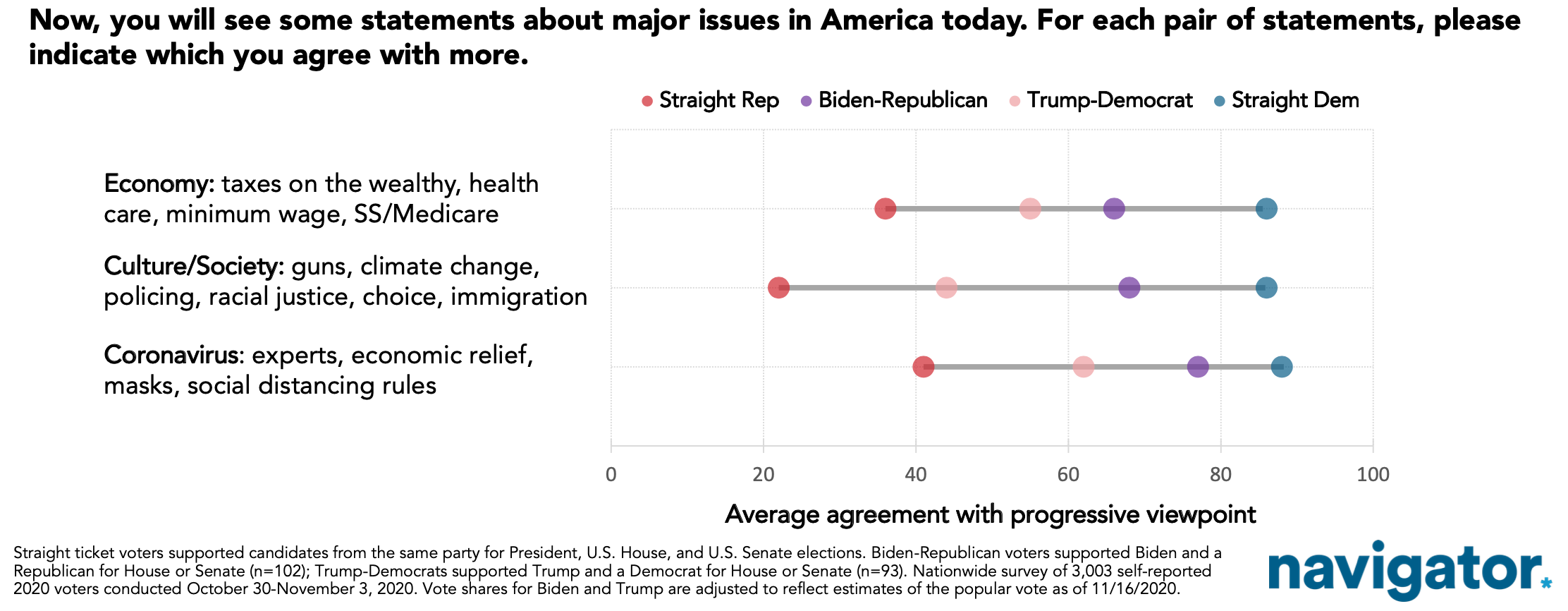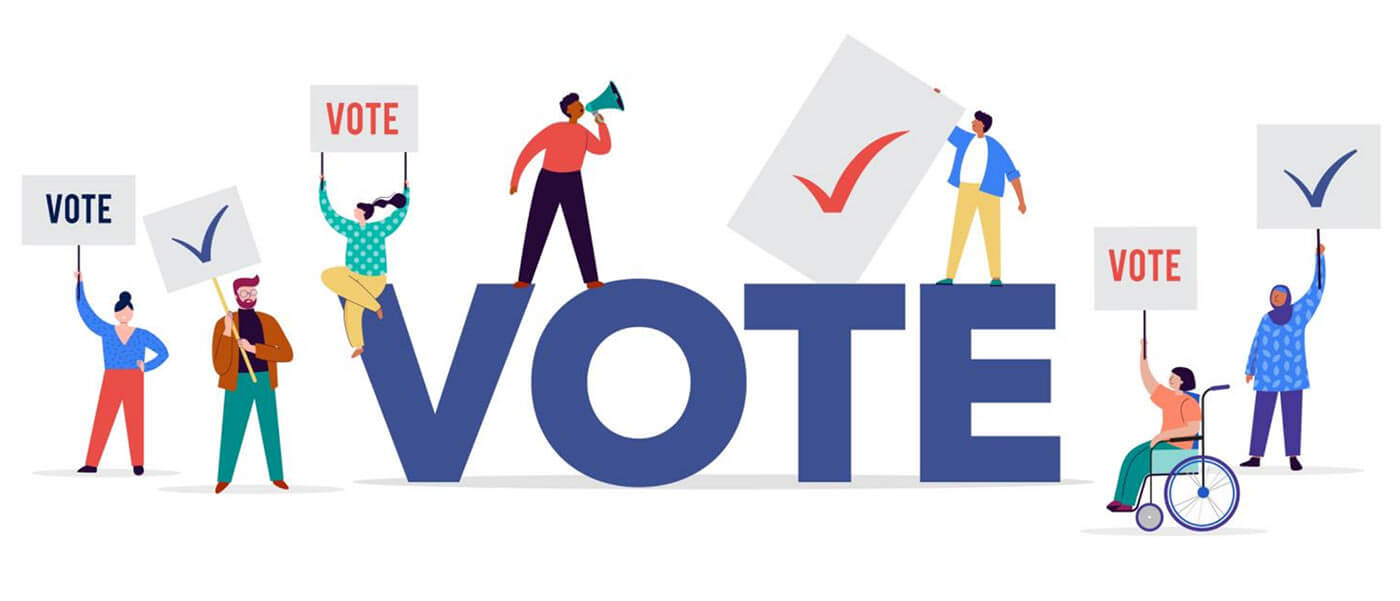Welcome to NAVIGATOR – a project designed to better understand the American public’s views on issues of the day and help advocates, elected officials, and other interested parties understand the language, imagery, and messaging needed to make and win key policy arguments.
This release features findings from a national online survey of 3,003 registered voters conducted October 30-November 3, 2020. The vote shares for Joe Biden and Donald Trump among self-reported 2020 voters were also adjusted to reflect a preliminary estimate of the national popular vote in the 2020 presidential election.
Key takeaways
This analysis seeks to understand several critical voting blocs that were ultimately determinative in the election. This includes:
- Trump-to-Biden voters (3% of sample) – A small, but important group of voters who switched from voting for Trump in 2016 to voting for Biden in 2020. These voters appear drawn in by Biden’s offer of unity and repelled by Trump’s handling of the pandemic.
- New Democrats (11% of sample) – This is a larger group of voters who were either too young to vote or sat on the sidelines in 2016 by staying at home or supporting a third- party candidate. These were generally more progressive voters motivated by dislike for Trump and the opportunity for positive change.
- New Trump voters (9% of sample) – These are the voters that kept Trump competitive, who backed him after sitting out 2016 or backing someone else. These mostly conservative voters have some conflicted opinions about the president but are overwhelmingly positive about his economic approach.
Other important groups included in the analysis are the “ticket splitters.” These voters supported the nominee from one party for president – but backed a candidate from the other party for the U.S. House or Senate.
- Biden-Republican Splitters (3% of sample) – These voters backed a Republican down ballot while voting for Joe Biden to be president. They are a relatively moderate and college-educated group who disliked Trump and disapproved of his pandemic response while showing more openness to his economic approach.
- Trump-Democrat Splitters (3% of sample) – These voters were relatively conservative in their disposition and almost universally approved of how Trump has handled the economy, though they backed the president with some reservations while sticking with a Democrat down ballot.
What We Did
The analysis is based on interviews with 3,003 registered voters who had already voted or planned to vote in the November election, with interviews conducted October 30th to November 3rd, 2020.
Support for Joe Biden and Donald Trump in the presidential election has been adjusted to reflect the actual expected popular vote as of November 16th. The analysis aims to provide a new tool for Americans to understand what happened in the 2020 election, why it happened… and what’s next.
Negativity About State of the Country Pervasive Among the Democratic Nominee’s New Supporters
Four in five New Democrats and Trump-to-Biden voters rank the economy, the pandemic, and the overall state of the country negatively, while new Trump voters are far more optimistic.
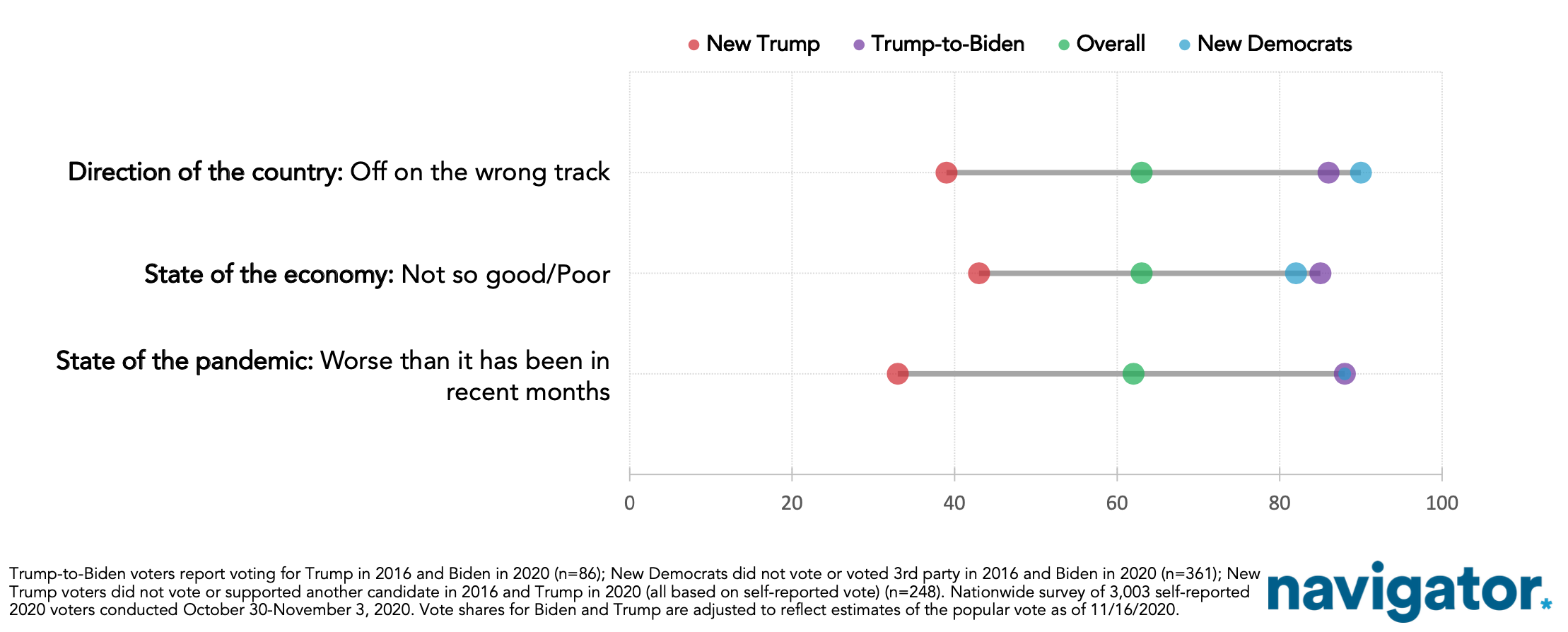
Both New Democrats and Trump Voters Had Hesitations, With a Majority of Trump-to-Biden Voters Deciding After September
A majority of New Democrats and New Trump voters “strongly supported” their candidate of choice, and majorities of each also decided their vote before September.
- A majority of Trump-to-Biden voters had hesitations about Biden, and they broke toward him late.
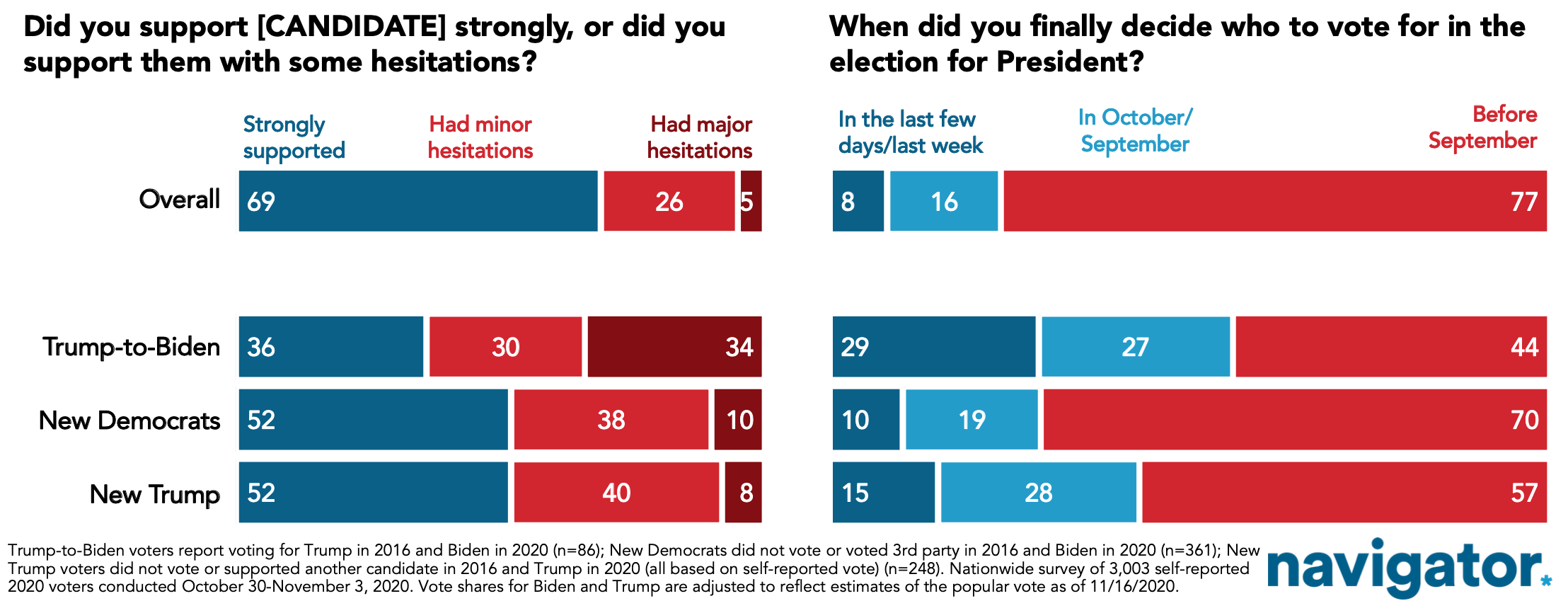
Trump a Key Driver for Those Who Flipped Against Him
For New Democrats, two in five say their vote was more of a vote “for Biden” while just 24% of Trump-to-Biden voters say the same.
- Three in five New Trump voters (61%) say their vote was more of a vote “for Trump.”
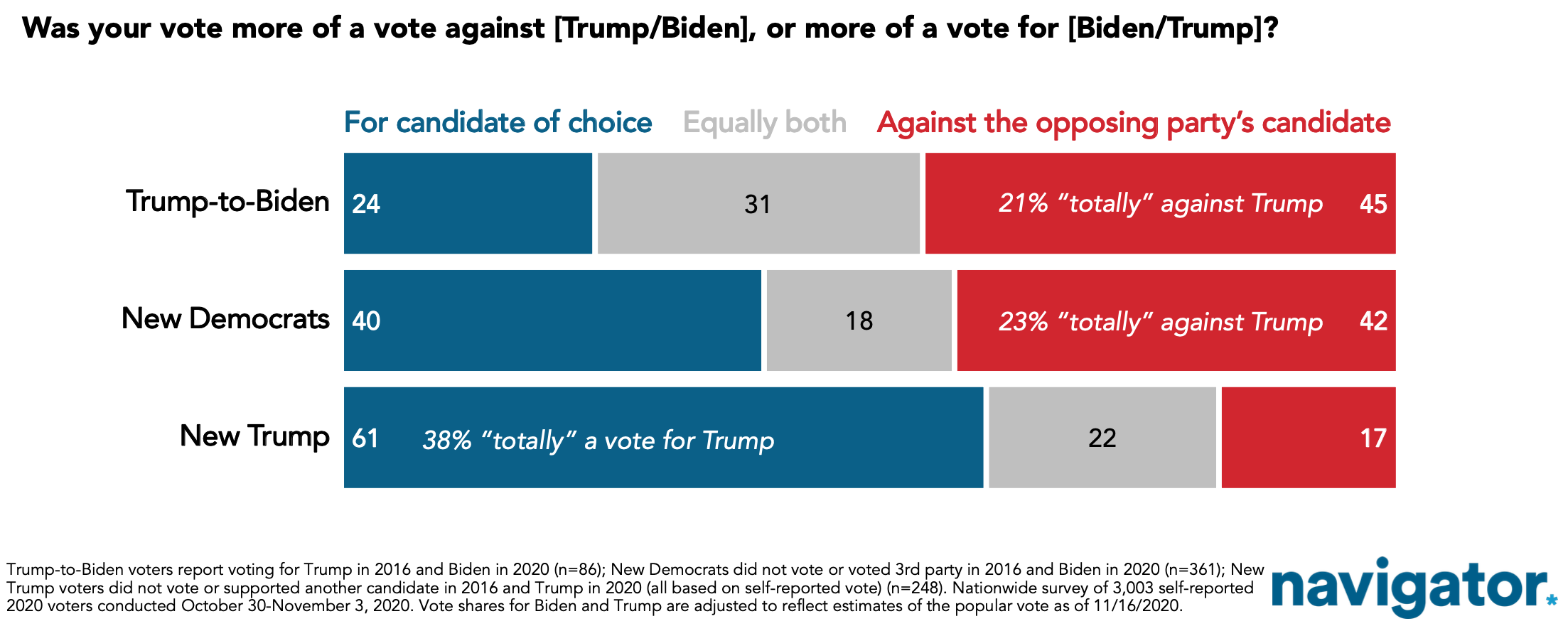
Biden’s Coalition Generally United in Political Views, Particularly on Economic Issues and Coronavirus
Though they are less progressive than New Biden and Biden voters overall, more than 60% of voters who reported voting for Trump in 2016 and Biden in 2020 agree with the more progressive of two statements on a range of issues.
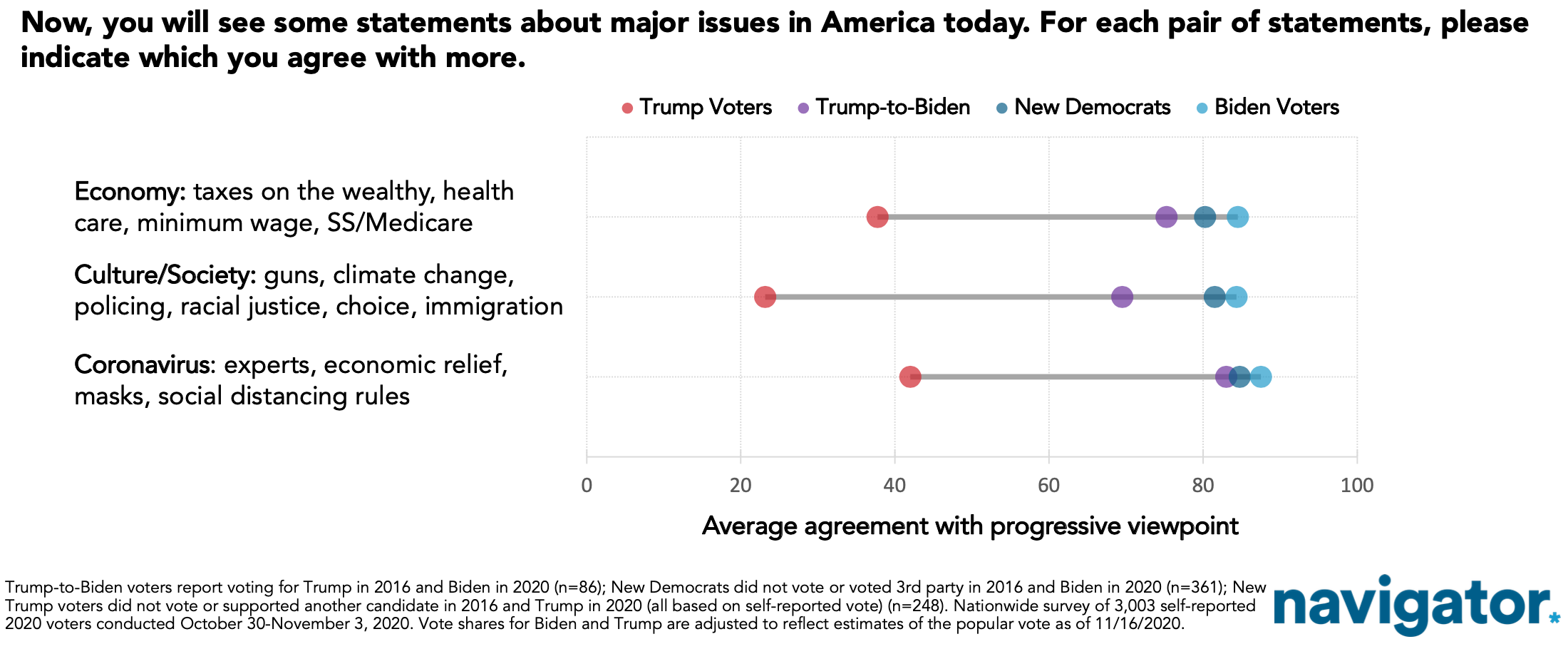
Concerns About Pandemic and Health Care Unite Biden’s Coalition
At least three in five Trump-to-Biden voters and New Democrats said the pandemic was one of the most important issues for them in deciding their vote for President, and at least two in five of each said the same of health care.
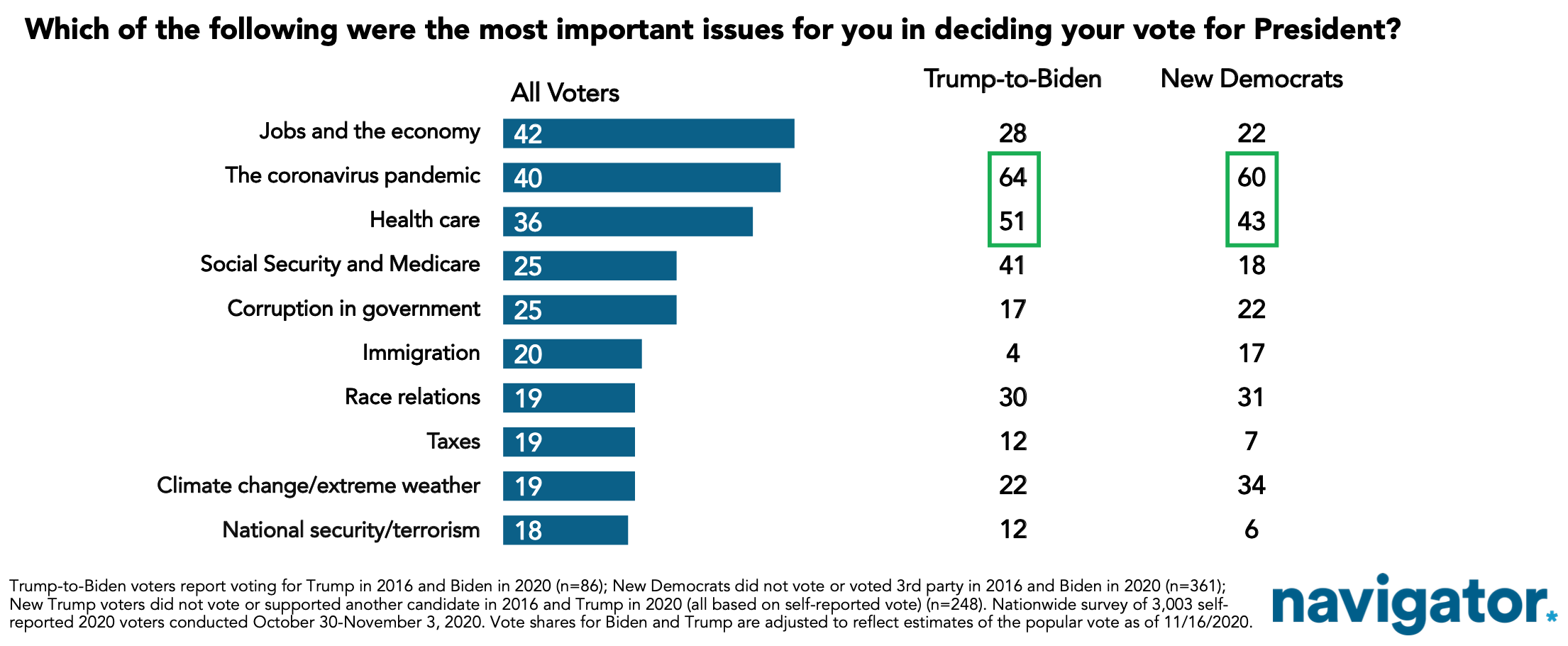
Age a Distinguishing Factor Within New Democratic Coalition
As reasons to support Biden, his voters most often cite his plan for the pandemic, national unity, and health care, but the younger cohort of New Democratic voters were drawn in by a wider set of issues.
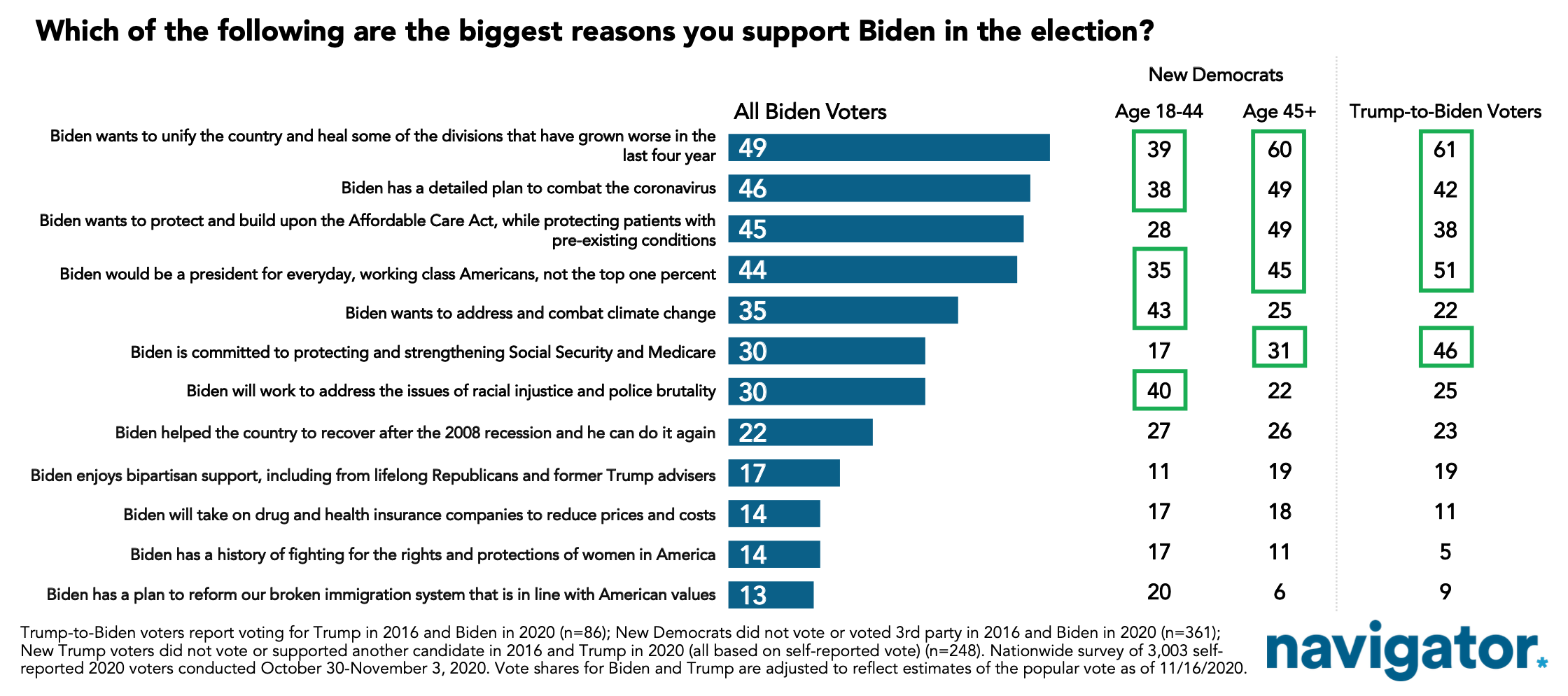
Biden Drew in Voters Looking for a President with “Honesty and Good Character” Who Would “Bring People Together”
A majority of older New Biden and Trump-to-Biden voters (52% each) said “honesty and good character” was one of the most important qualities in their vote this year, as did 39% of younger New Biden voters. A third of younger New Biden voters (33%) also said “can bring change” was one of the most important.
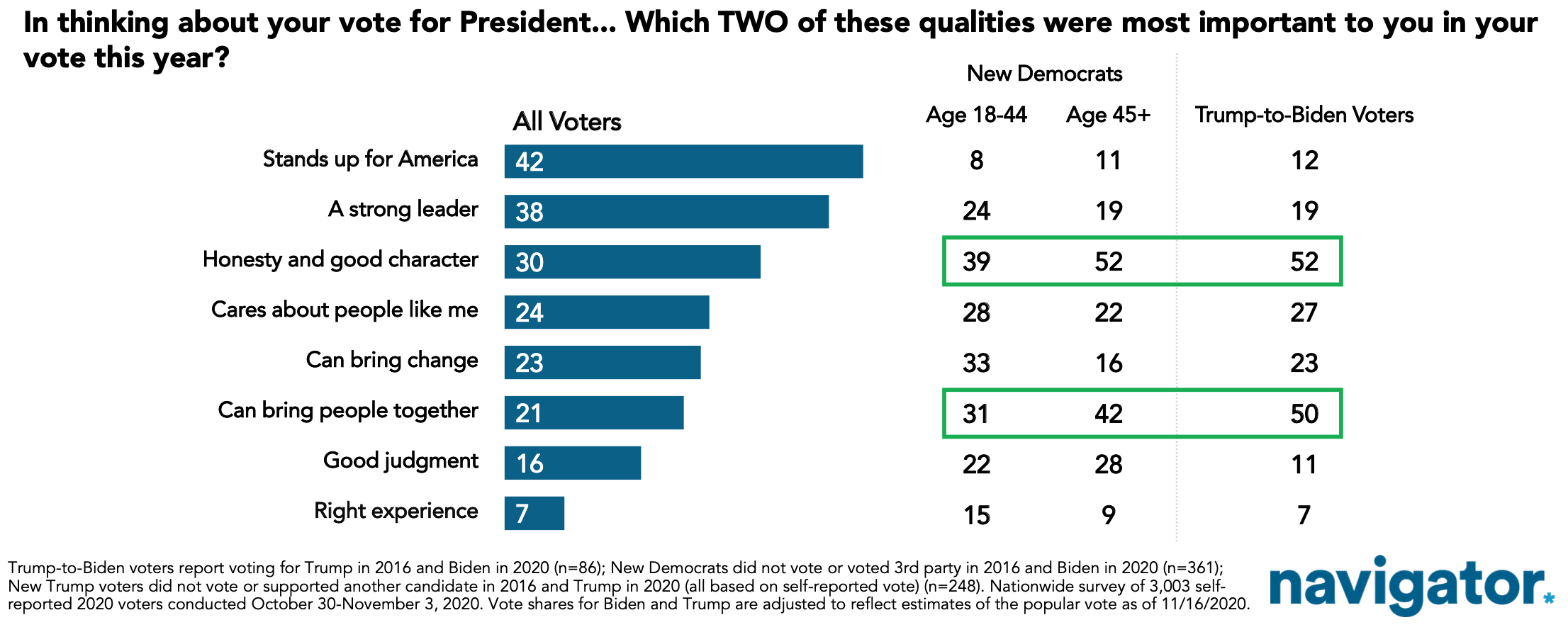
Failures Handling Pandemic and Attempts to Divide Americans: Top Reasons for New Biden Voters to Vote Against Trump
Among Trump-to-Biden voters, another top reason (45%) was Trump’s constant tweeting and putting himself first.
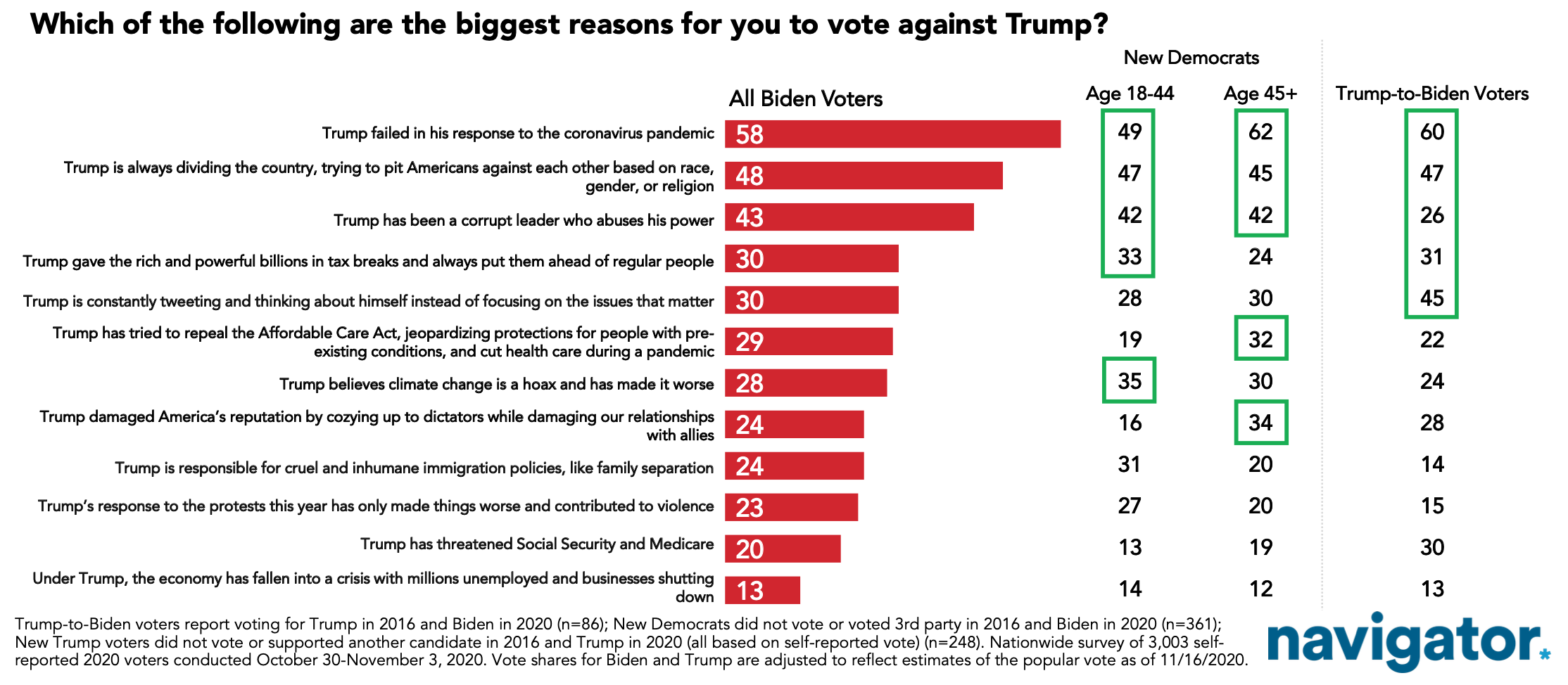
Ticket Splitters Especially Likely to Identify as Politically Moderate and Independent
A quarter of both Biden-Republican and Trump-Democrat ticket splitters identify as independents without any partisan lean. A majority of Biden ticket splitters identify as moderate, as do two in five Trump ticket splitters.
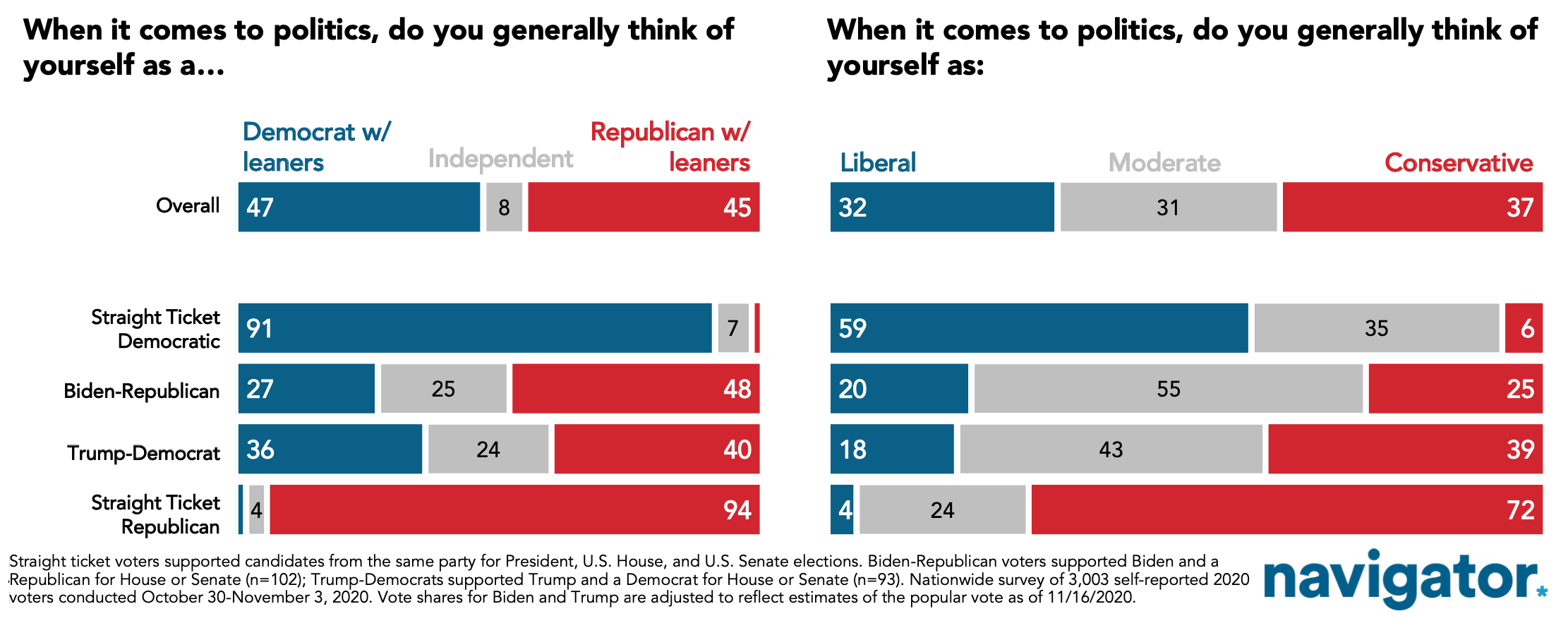
Ticket Splitters Differ From Their Straight Ticket Counterparts in Important Ways
Biden voters who voted for Republicans down ballot look less Democratic on a range of metrics: they report higher levels of Fox News consumption, college education, churchgoing, and gun ownership.
- Much like straight ticket Democratic voters, Biden-Republican splitters gave Trump low marks on his handling of the pandemic: however, on the economy, 41% approve of his handling.
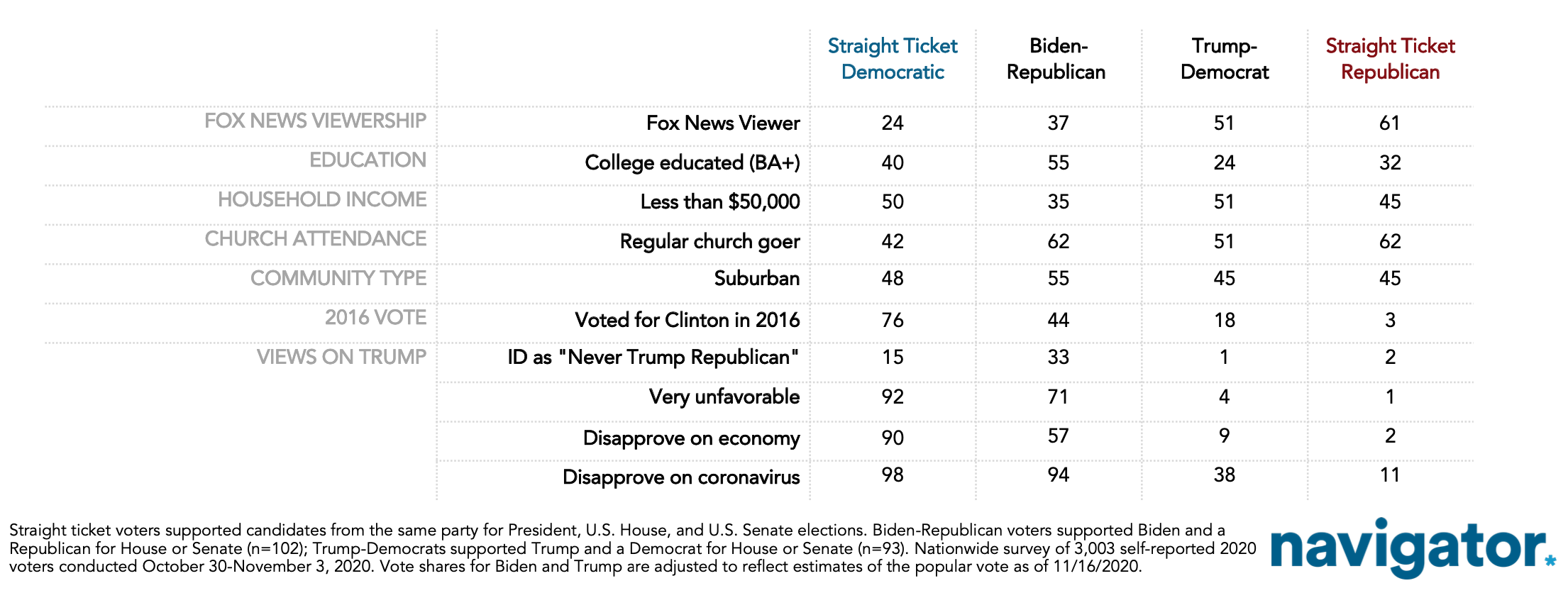
Coronavirus – But Also the Economy – Were Key Issues for Biden-Republican Ticket Splitters in the Presidential Race
While three in five straight ticket Democratic voters said the coronavirus was one of the most important issues in their vote for President, seven in ten Biden-Republican ticket splitters said the same.
- Similar to straight ticket Republicans, 54% of Trump-Democrat ticket splitters said jobs and the economy was a top issue, and 36% said the same of taxes.
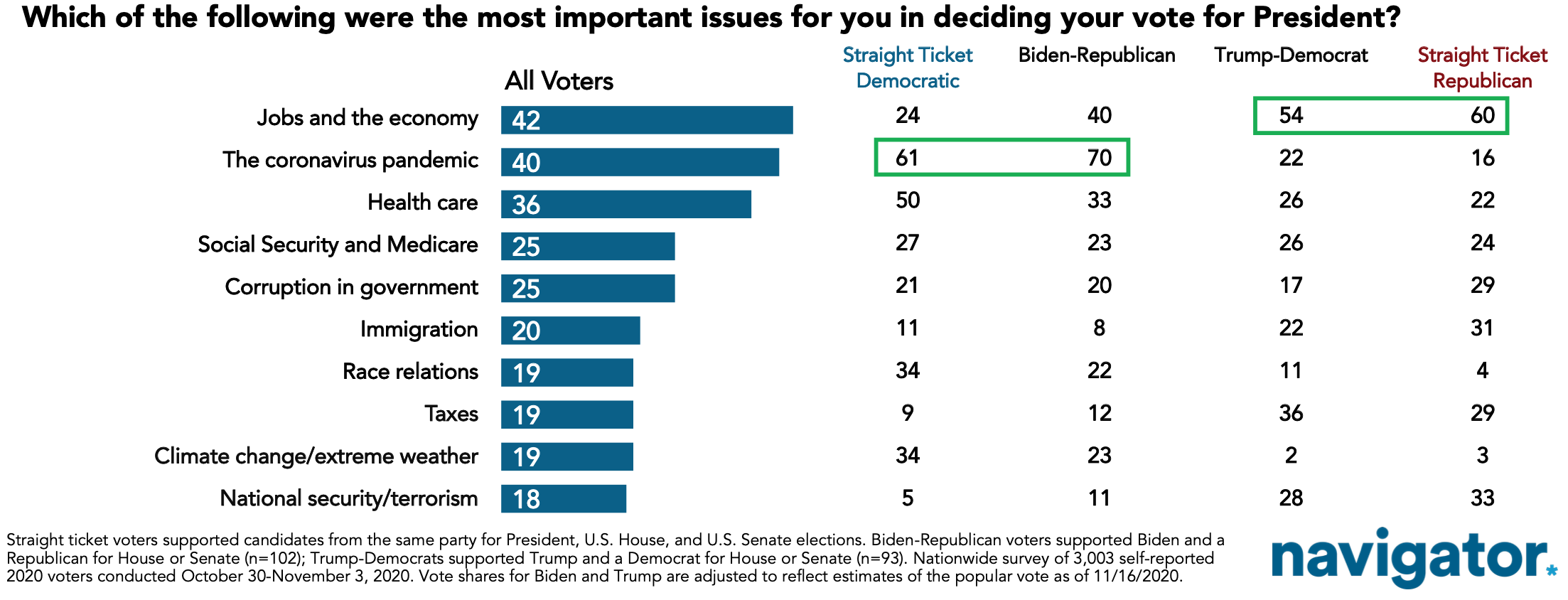
Unity and Coronavirus Plan Especially Important to Biden’s Appeal Among Ticket Splitters
While more than 45% of straight ticket Democrats rated a range of issues from division to Biden working for everyday Americans and not the top one percent as the most important, ticket splitters focused on unity and the pandemic.
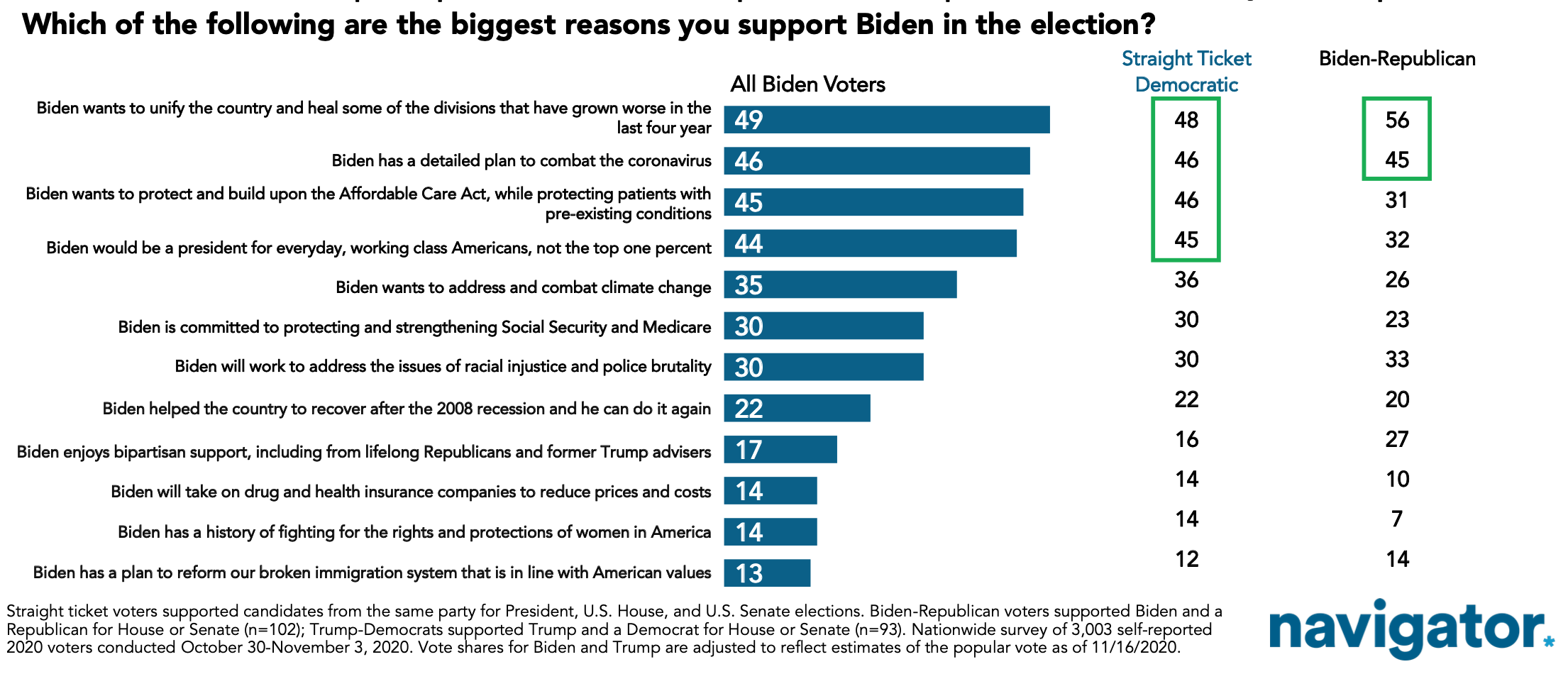
More Than Three in Five Biden-Republican Voters on Average Support Progressive Economic, Cultural, and Pandemic Policies
At least 60% of Biden-Republican ticket splitters on average agreed more with progressive statements related to the economy, culture/society, and coronavirus, while majorities of Trump-Democrats also agreed with the more progressive side of key debates related to the pandemic and the economy.
